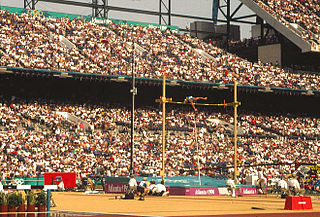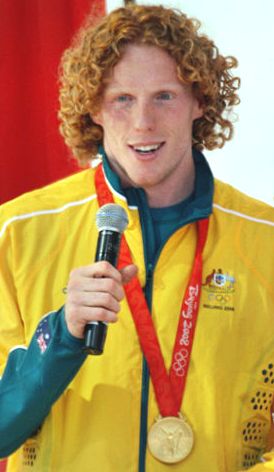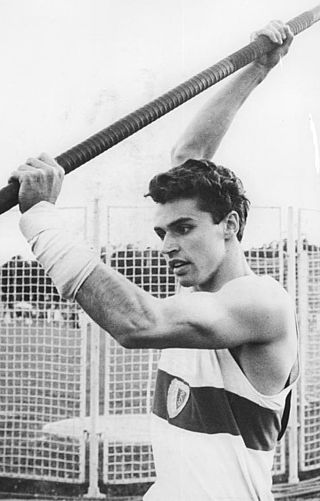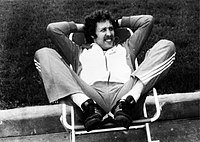
Tadeusz Ślusarski was a Polish Olympic gold medalist in pole vault at the 1976 Olympics, as well as a silver medalist at the 1980 Olympics.
Athletics at the 1980 Summer Olympics was represented by 38 events: 24 for men and 14 for women. They were held in the Grand Arena of the Central Lenin Stadium at Luzhniki between July 24 and August 1. There were a total number of 959 participating athletes from 70 countries.

Poland competed at the 1980 Summer Olympics in Moscow, USSR. 306 competitors, 232 men and 74 women, took part in 162 events in 21 sports.

Władysław Kozakiewicz is a Lithuanian-born retired Polish athlete who specialised in the pole vault. He is best known for winning the gold medal at the 1980 Summer Olympics in Moscow and the bras d'honneur gesture which he showed to the hostile Soviet crowd. In Poland, where the gesture was viewed as a symbol of resistance against Soviet dominance, it became known as "Kozakiewicz's gesture". In addition, he won several medals at continental level, won two Summer Universiades and broke the pole vault world record three times, twice outdoors and once indoors. He is also a ten-time Polish champion.

Jean Galfione is a French retired pole vaulter. During his pole vaulting career, he won at least one medal in each of the following major international competitions - the Olympic Games, the World Championships, the World Indoor Championships, the European Championships and the European Indoors Championships

Thierry Vigneron is a retired French pole vaulter. In the 1980s, he was among the world's leading pole vaulters. He broke the world record in the event four times and was the last man to hold the world record before Sergey Bubka, who would hold on to it almost 30 years until February 2014.

Pierre Quinon was a pole vaulter from France who won the 1984 Olympic Games pole vault gold medal and held the pole vault outdoor world record for just four days in the summer of 1983.
Philippe Houvion is a retired French pole vaulter. On 17 July 1980 in Paris, Houvion jumped 5.77 metres, beating the world record of Thierry Vigneron by two centimetres. The record only lasted until 30 July 1980, when Władysław Kozakiewicz of Poland jumped 5.78 metres in Moscow. Houvion was born in Briey, Meurthe-et-Moselle. He was coached by his father, Maurice Houvion, after being talked out of a career in football.
The men's pole vault at the 1988 Summer Olympics in Seoul, South Korea had an entry list of 21 competitors from 13 nations, with two qualifying groups before the final (15) took place on Wednesday September 28, 1988. The maximum number of athletes per nation had been set at 3 since the 1930 Olympic Congress.

The men's pole vault was an event at the 1996 Summer Olympics in Atlanta, Georgia. Thirty-seven athletes from 24 nations competed. The maximum number of athletes per nation had been set at 3 since the 1930 Olympic Congress. The event was won by Jean Galfione of France, the nation's second victory in the event. Igor Trandenkov took silver, the first medal for Russia in the pole vault in its first appearance as a separate delegation. Similarly, Andrei Tivontchik's bronze was the first for reunified Germany, though both East Germany and West Germany as well as the Unified Team of Germany had previously won medals.

The Men's Pole Vault was an event at the 1992 Summer Olympics in Barcelona, Spain. There were a total number of 34 participating athletes from 23 nations. The maximum number of athletes per nation had been set at 3 since the 1930 Olympic Congress. The qualification mark was set at 5.60 metres.

The men's pole vault event at the 1984 Summer Olympics in Los Angeles, California had an entry list of 19 competitors from 13 nations, with two qualifying groups before the final (12) took place on Wednesday August 8, 1984. The maximum number of athletes per nation had been set at 3 since the 1930 Olympic Congress. The event was won by Pierre Quinon of France, the nation's first medal in the men's pole vault. France also took one of the two bronze medals after Thierry Vigneron tied with Earl Bell of the United States for third. Mike Tully, also American, earned silver. Bell and Tully continued the American streak of podium appearances in the event every time the United States competed.

The men's pole vault at the 2008 Summer Olympics took place on 20 and 22 August at the Beijing National Stadium. Thirty-eight athletes from 25 nations competed. The event was won by Steven Hooker of Australia, the nation's first medal in the men's pole vault. Russia took its third medal of the four Games since competing independently; including Russian vaulters for the Soviet Union and Unified Team, Russians had taken six medals in the last six Games. The bronze medal initially went to Denys Yurchenko of Ukraine, but was later stripped from him for doping offenses and reassigned to fourth-place finisher Derek Miles of the United States.

The men's pole vault field event at the 1960 Olympic Games took place on September 5 and September 7. Twenty-nine athletes from 20 nations competed. The maximum number of athletes per nation had been set at 3 since the 1930 Olympic Congress. The event was won by Don Bragg of the United States, the nation's 14th consecutive victory in the men's pole vault. Ron Morris took silver, making it three straight Games the American team had finished 1–2. Eeles Landström's bronze was Finland's first medal in the event since 1948.

The men's pole vault was a competition at the 2012 Summer Olympics in London, United Kingdom. The event was held at the Olympic Stadium on 8–10 August. Thirty-two athletes from 23 nations competed. The event was won by Renaud Lavillenie of France, the nation's first victory in the event since 1996 and third overall. Björn Otto and Raphael Holzdeppe of Germany took silver and bronze, respectively; like France, it was the first time since 1996 that Germany reached the men's pole vault podium.

The men's pole vault field event at the 1972 Olympic Games took place on September 1 & 2. Twenty-one athletes from 12 nations competed. The maximum number of athletes per nation had been set at 3 since the 1930 Olympic Congress. The event was won by Wolfgang Nordwig of East Germany, the first non-American to win the event. Nordwig and silver medalist Bob Seagren were the third and fourth men to win multiple medals in the event.

The men's pole vault competition featured in the athletics programme at the 1976 Summer Olympics and was held at the Olympic Stadium in Montréal on 24 and 26 July. Twenty-seven athletes from 13 nations competed. The maximum number of athletes per nation had been set at 3 since the 1930 Olympic Congress.

The men's pole vault was one of four men's jumping events on the athletics program at the 1968 Summer Olympics. The competition had two rounds, qualifying and a final, which were held on 14 and 16 October respectively at the Estadio Olímpico Universitario in Mexico City. Twenty-three athletes from 15 nations competed. The maximum number of athletes per nation had been set at 3 since the 1930 Olympic Congress. The event was won by Bob Seagren of the United States, the nation's 16th consecutive victory in the men's pole vault. Claus Schiprowski of West Germany took silver, while Wolfgang Nordwig of East Germany took bronze—the first medals for each of those nations as separate teams, though two West German vaulters had earned silver and bronze for the United Team of Germany in 1964.
Dan Ripley is a retired American track and field athlete, known primarily for his success in the pole vault. Between January 18, 1975 and March 3, 1979 he improved the indoor World record in the pole vault five times.

The men's pole vault event at the 2020 Summer Olympics took place between 31 July and 3 August 2021 at the Japan National Stadium. 29 athletes from 18 nations competed. Armand Duplantis of Sweden won gold, with Christopher Nilsen of the United States earning silver and Thiago Braz of Brazil taking bronze. It was Sweden's first victory in the event and first medal of any color in the men's pole vault since 1952. Braz, who had won in 2016, became the ninth man to earn multiple medals in the pole vault.















